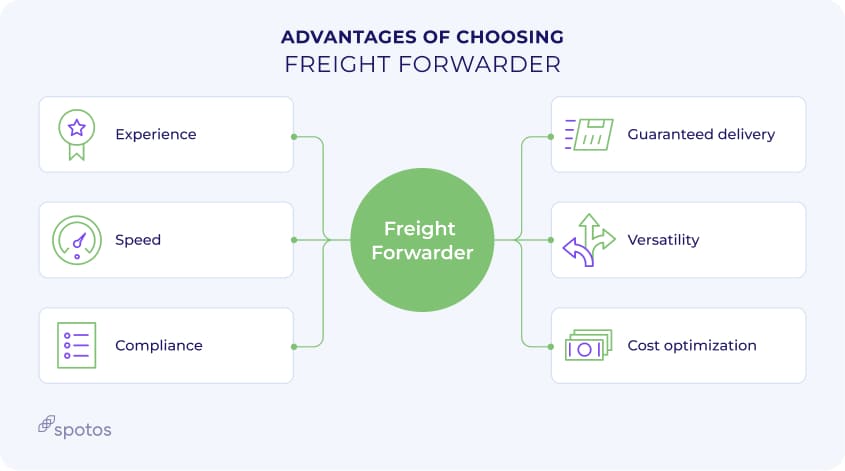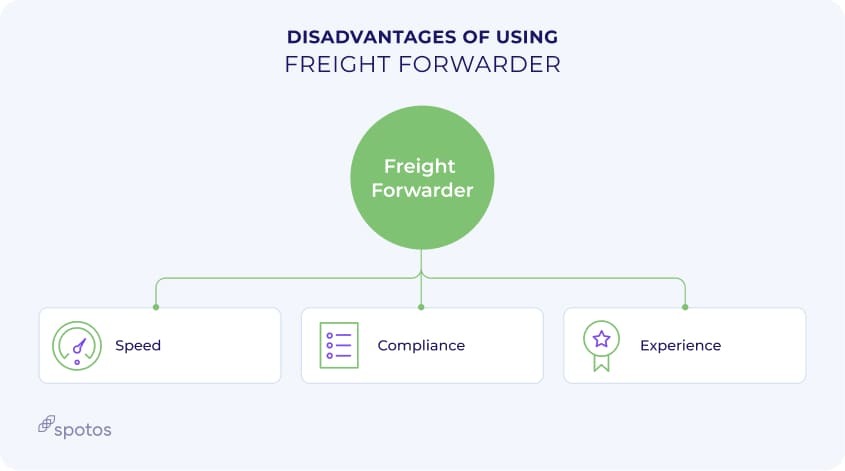Freight forwarding services are widely used by many companies that ship products worldwide. A freight forwarder handles the entire shipping process, from picking up the goods to delivering them to the destination within the guaranteed arrival time.
As a result, freight forwarders have become a popular choice among businesses with a complicated supply chain that extends through many countries. Unsurprisingly, however, freight forwarding services can get fairly expensive, so buying them might not be as mandatory as it may seem at first.
What is a freight forwarder?
A freight forwarder is a company specializing in handling international shipping. Experienced freight forwarders can take goods from anywhere and get them to the desired location without issues. They provide guaranteed delivery times and take care of every step of the process. Services provided by freight forwarders include:
- Cargo insurance
- Managing any potential claims
- Customs clearance
- Shipping and export documentation
- Route optimization
- Paperwork preparation
- Multiple modes of transportation
Some freight forwarders may also take care of product distribution on behalf of their customers. Generally, these companies can take care of anything related to logistics and shipping; however, costs rise to the amount of work performed.
In the end, a freight forwarder is a company that manages international shipping by using its networks of carriers and other businesses to ensure the timely delivery of freight. Businesses often employ freight forwarding services to avoid managing to ship on their end.
What advantages does a freight forwarder provide to a carrier?
Freight forwarders bring a lot of benefits to the table. From route optimization to legal knowledge, the companies are fully prepared to take over cargo and get them to the required destination without hiccups.
Experience
Shipping and delivery are complicated, especially when moving goods through several countries. An in-house team to manage such a process would be a huge resource sink, requiring numerous experts in diverse fields.
A freight forwarder lets companies outsource these worries. Since they are involved in an industry that only revolves around shipping, they can have numerous in-house experts to ensure that all goods pass customs and are delivered on time.
Additionally, they can consult businesses on the best ways to package and mark goods, depending on the modes of transportation. Finally, they will have experts who can optimize routes to any destination, meaning delivery times and costs will be lower.
Speed
Going off the route optimization benefit, experienced freight forwarders can align deliveries across the entire supply chain in a way that reduces wasted time. Managing multiple carriers, customs clearance, and many other aspects of shipping.
For example, lengthy delays are common when incomplete or inaccurate documentation is provided to customs. These occurrences aren’t that infrequent when businesses manage international shipping in-house. A freight forwarder completely solves that issue.
Compliance
Almost every freight forwarding company has a large in-house team of legal experts with in-depth knowledge about insurance, exports, imports, customs, and many other regulatory aspects of the business. As laws between countries differ heavily, freight forwarders can ensure that goods never get stuck in legal limbo.
Also, freight forwarders can consult and help shipping companies involved in legal issues. While they mostly attempt to prevent any such arising in the first place, legal knowledge comes in handy when shipping runs into issues.
Guaranteed delivery
Most freight forwarders guarantee the delivery of goods. Not only do they provide insurance, but they also take physical possession of the freight, meaning they are legally liable if something happens to it.
Additionally, most governments have stricter laws for businesses directly involved with shipping, meaning that companies that buy freight forwarding are often better protected through legislation.
Versatility
Most freight forwarding companies will adapt to the customer and provide services only needed for them. They will allocate the necessary resources for deliveries without overspending in areas where businesses going solo might make mistakes.
Additionally, having a freight forwarder means more flexibility in choosing the provider. If your business were to do all shipping by itself, switching service providers would take an enormous time. With a freight forwarder, you can negotiate different providers or change it.
Cost optimization
A freight forwarder will often be able to negotiate much better rates with carriers as they are constantly moving goods, which means they can ensure that trucks get filled regularly. In other words, freight forwarders can reduce costs through economies of scale.
While, as usual, a part of the savings is passed on to their customers as a freight forwarder’s margin, many companies would have trouble getting similar rates. So, a freight forwarding service is optimal for smaller businesses as they would not have access to negotiations for similar rates.

What are the disadvantages of using a freight forwarder?
While a freight forwarder is nearly always a good idea, there are some caveats. These services can be costly, require trust, and the potential for losses remains.
Costs
For most businesses, having a freight forwarder will save money in the long run. Yet, a freight forwarding service will necessitate large upfront costs that could cut into the overall profits of a business.
Additionally, businesses with established shipping networks might gain less from a freight forwarder, making their services harder to justify.
Entrustment issues
Regardless of how well the company is established and how much you trust them, freight forwarding gives your goods to someone else. They will take physical possession of the cargo, and you won’t know how it’s going until the delivery reaches the intended destination.
Some freight forwarders will ease the worries by providing in-depth communication and assurances; however, the issue will always remain. It’s simply a part of being in the industry.
Potential losses
A freight forwarder works through its network of carriers and other companies. While in most countries, your goods will be insured and protected through various laws, there are some areas where the regulatory mechanisms aren’t as well implemented.
Additionally, even with insurance, getting claims and working through the entire process still means lost time and, potentially, revenue. In the end, there is potential loss even with the best protections.

Reasons to choose Spotos as your freight forwarder
Spotos is an innovative marketplace that connects shippers with carriers. You get complete freedom on who to hire to manage your shipping needs with in-depth data about every carrier provided on the platform.
Through our marketplace, you can manage contracts and communicate with carriers. Our algorithm will recommend the best prices based on your needs. Additionally, we will take care of contracts, guarantee cargo safety, and distribute payments.
Even if any issues arise during shipping, the Spotos team will take care of insurance claims and ensure that your high-value cargo is protected from losses. Finally, you can choose your partners with peace of mind as carriers and shippers are carefully vetted to ensure that only those who can provide quality services end up on our platform.
Frequently asked questions
Less-than-truckload shipping is most often used by businesses that:
- Carry robust products that are not sensitive to movement or temperatures
- Freight does not cover the entire truckload
Additionally, some companies choose LTL shipping to lessen environmental impact.
Full truckload shipping is popular among businesses that can cover an entire truckload.
Also, companies operate with fragile products.
Additionally, some prefer FTL shipping due to better delivery times and estimations. They are allowing those businesses to make better predictions.
At extremely optimal conditions, LTL can be equally as fast as FTL. However, LTL will almost always be slower in practice because trucks stop at numerous locations to unload the freight. Several stops increase the likelihood of human error, making delivery date predictions harder.
As a rule, anything less than six pallets is considered LTL. In practice, LTL is any amount of freight that does not cover an entire truckload.
If the freight does not cover the entire space in the truck, then LTL will almost always be cheaper. FTL becomes cheaper when cargo can protect the truckload or is extremely close to doing so.
